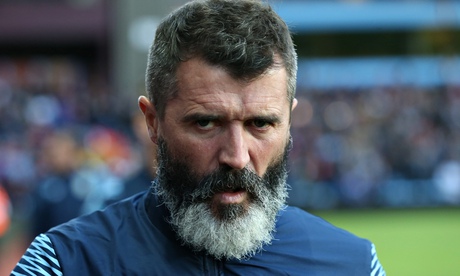
Reading, in the past couple of days, back to back, the trials and torments of Kevin Pietersen and Roy Keane, the slights suffered and the parody tweets borne, the training-ground spats and the dressing-room whispers – subtext: were two men ever more cruelly wronged? – I found myself reaching for Aristotle’s Poetics. The true tragic hero is the man, you’ll remember, “who is highly renowned and prosperous, but one who is not pre-eminently virtuous and just, whose misfortune, however, is brought upon him not by vice or depravity but by some error of judgment or frailty, his hamartia [fatal flaw].” KP, Keano, come on down…
I don’t know if astute publishers or an act of the gods gave us these two tragic volumes within hours of each other, but it is hard, in the spirit of a million student essays, not to compare and contrast. The trajectory of both narratives is near identical, after all. Our hero, close to godlike, even though he says it himself, wins through multiple battles and triumphs: he carries his brothers (Darren Fletcher and the Nevilles in the case of Keane, Trotty and Harmy for KP) when they falter, he never once wavers in his fortitude or spirit, lends glory to all he touches, but is inevitably, at the last, misunderstood and betrayed by men who, in honour and courage, are barely fit to lace his Nikes. He finally is brought so low that all he has left to give is the sorry saga of that downfall. His only bequest is exclusive inside stories that will be sung on phone-ins and retold on back pages down the ages, while grown men still care about truth and justice (and about who may have disrespected whom behind closed doors at Old Trafford or the Oval in the first years of our millennium).
It is worth noting, in the time of social media feuds and the drip-feeding of favoured journalists, that both men stoutly believed that the only medium worthy of the mighty reversals they suffered was a (pre-Christmas) book. They turned, respectively, to two of the most esteemed chroniclers of our times. KP had David Walsh of the Sunday Times tell his tale of rejection and humiliation by the English Cricket Board, a symbolic as well as a judicious choice, since Walsh has made his distinguished name in exposing the (other) greatest scandal of our sporting era, the drug-cheating of Lance Armstrong. Keano, meanwhile, for his second stab at deathless prose, confided in the Booker prizewinner Roddy Doyle, who makes his man’s confessional at times sound like an internalised Beckett monologue (“I don’t want to go back, but I need to, I have to… I couldn’t budge… But I was under contract”), and who, no doubt, had the good sense to steer him away from the title “Alex Ferguson Ha Ha Ha”.
You will, if you care, and even if you have no intention of buying the books, probably already have committed some of the more cathartic passages of each to memory – Pietersen squaring up to his England coach Andy Flower to tell him: “You’re playing by fear here, you want guys to be scared of you. And, Andy, I’m not scared of you.” Keane turning to Ferguson in front of the assembled Manchester United squad to say: “You, gaffer, we need fuckin’ more from you. We’re slipping behind other teams.”
But passages in isolation do not capture the sheer self-rightous, Where the Wild Things Are pride of both parties. Both men have the tragic hero’s solipsistic view of the world, the sense that compromise – seeing the other guy’s point of view – would be a sign of weakness.
Pietersen’s account revels in a surreal and sustained capacity for insult. Flower becomes the “Mood Hoover” sucking life out of our hero; KP’s nemesis in the team, wicketkeeper Matt Prior, is “Le Grand Fromage”, a moniker that leads Pietersen to devote whole paragraphs to curdled invective: “Our cheese was out there growing runny in the heat. A Dairylea triangle thinking he was brie…” and so on, and on. Keane, for his part, while seeing it as his prerogative to dish out physical and verbal aggression pretty much as he sees fit, on the field and off, has total recall for every tiny slur against his good name and nurtures each one over seasons and years.
There is much that is defiant and enjoyable in their respective refusal to take a single step back in the face of the kind of over-managed pettiness that dogs the modern professional sportsman’s life – both men refuse to let the management decide when and where they can see their wives, for example. It’s the adamantine spirit that made them both such thrilling competitors to watch. But, clearly, eventually, they were never going to win.
Each man trails numbers, stats that speak for themselves. The Man United captain played 600 times and won seven Premier League titles and a European Champions League; Pietersen, double Ashes winner, is England’s most prolific run-scorer of all time in all forms of the game. In both cases, however, it is not the decade of triumph that they dwell on, but the manner of its ending. For all the sweat and glory that preceded it, their lasting focus is, sadly, on the monosyllabic exchanges in an office, each lasting “less than five minutes”, that marked the final act. As Oedipus or Othello might have explained in a post-match interview, at the end of the day, Brian, life just isn’t fair.
KP: The Autobiography is published by Sphere (£20). Click here to buy it for £16. The Second Half is published by Weidenfeld & Nicolson (£20). Click here to buy it for £16

